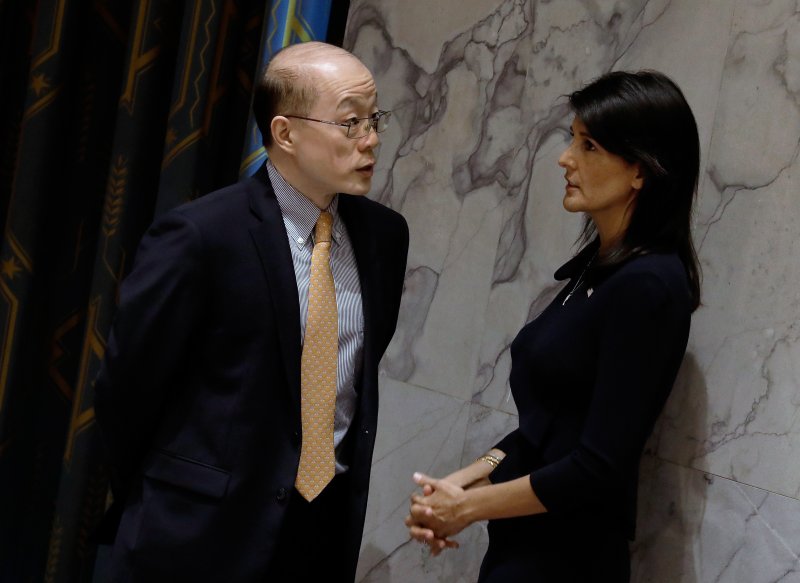1 of 2 | U.S. Ambassador Nikki Haley speaks with Chinese Ambassador Liu Jieyi before an emergency U.N. Security Council meeting in New York on Monday, one day after North Korea announced it had conducted a test of a hydrogen bomb. Photo by Peter Foley/EPA
Sept. 4 (UPI) -- U.S. United Nations Ambassador Nikki Haley said that North Korean leader Kim Jong Un is "begging for war" because of his "abusive use of missiles" during an emergency meeting of the U.N. Security Council on Monday.
Haley said "enough is enough" after the regime announced Sunday it had conducted an underground test of a hydrogen bomb that is 10 times stronger than last year's detonation and can fit atop an intercontinental missile capable of striking the U.S. mainland.
"The time for half measures in the Security Council is over," Haley said. "The time has come to exhaust all of our diplomatic means before it is too late. We must now adopt the strongest possible measures. Kim Jong Un's action cannot be seen as defensive."
Haley said "an incremental approach" against North Korea has failed "despite the best of intentions."
"We have kicked the can down the road long enough," she said. "There is no more road left."
Britain's ambassador to the U.N., Matthew Rycroft, said during the session: "Dialogue will always be our end goal but returning to dialogue without a serious sign of intent from Pyongyang would be a set-up to failure. North Korea must change course to allow a return to dialogue."
The U.N. Security Council last conduced an emergency session on July 5, one day after North Korea conducted an intercontinental ballistic missile test.
"It is a dark day because yesterday's actions by North Korea made the world a more dangerous place," Haley said at the time.
Last Tuesday, the council condemned the North's "outrageous" ballistic missile, which the nation had launched over Japan just hours earlier.
Last month, the council imposed its stiffest sanctions yet on North Korea. China and Russia declined to veto the sanctions on North Korea's top exports, which bring in about $3 billion annually to help fund the communist government.
On Monday, Haley said the United States does not want war but the regime is testing its patience.
On Sunday, Secretary of Defense James Mattis said Pyongyang would face a "massive military response" should it threaten the United States or its allies.
President Donald Trump said "we'll see" on Sunday when asked whether the United States will attack North Korea.
Early Monday, South Korea conducted live-fire exercises simulating a strike against North Korea in training exercises.
The nation has been deploying more U.S.-made Terminal High-Altitude Area Defense missile launchers, which could shoot down its neighbor's rockets.
South Korea says it believes that the North is preparing to launch more missiles, including the possibility of an intercontinental ballistic missile.
"We have continued to see signs of possibly more ballistic missile launches. We also forecast North Korea could fire an intercontinental ballistic missile," South Korea defense ministry official Chang Kyung-soo told the Parliament.
Trump spoke Monday with South Korean President Moon Jae-in.
One day earlier, Trump had criticized the new liberal leader's push for negotiations with the North.
Trump and Moon agreed to lift the 1,100-pound restrictions on the payload weight of South Korea's ballistic missiles, according to a South Korean presidential spokesman.
Moon, who spoke with Trump on Friday about trade, replaced impeached President Park Geun-hye in May.
"The first thing we need to do is to cool down the rhetoric against our main ally in the region, South Korea," said Bill Richardson, the former U.S. ambassador to the United Nations, said to CNN. "We shouldn't threaten abolishing the free trade agreement, the appeasement talk. This is the way the South Korean president was elected. He wanted a dialogue with North Korea, try to stamp out corruption, so this is his own internal politics. I think we have to stand behind South Korea."
South Korea is banned from building its own nuclear weapons under a 1974 atomic energy deal signed with Washington. Instead the United States provides a "nuclear umbrella" against potential attacks.















